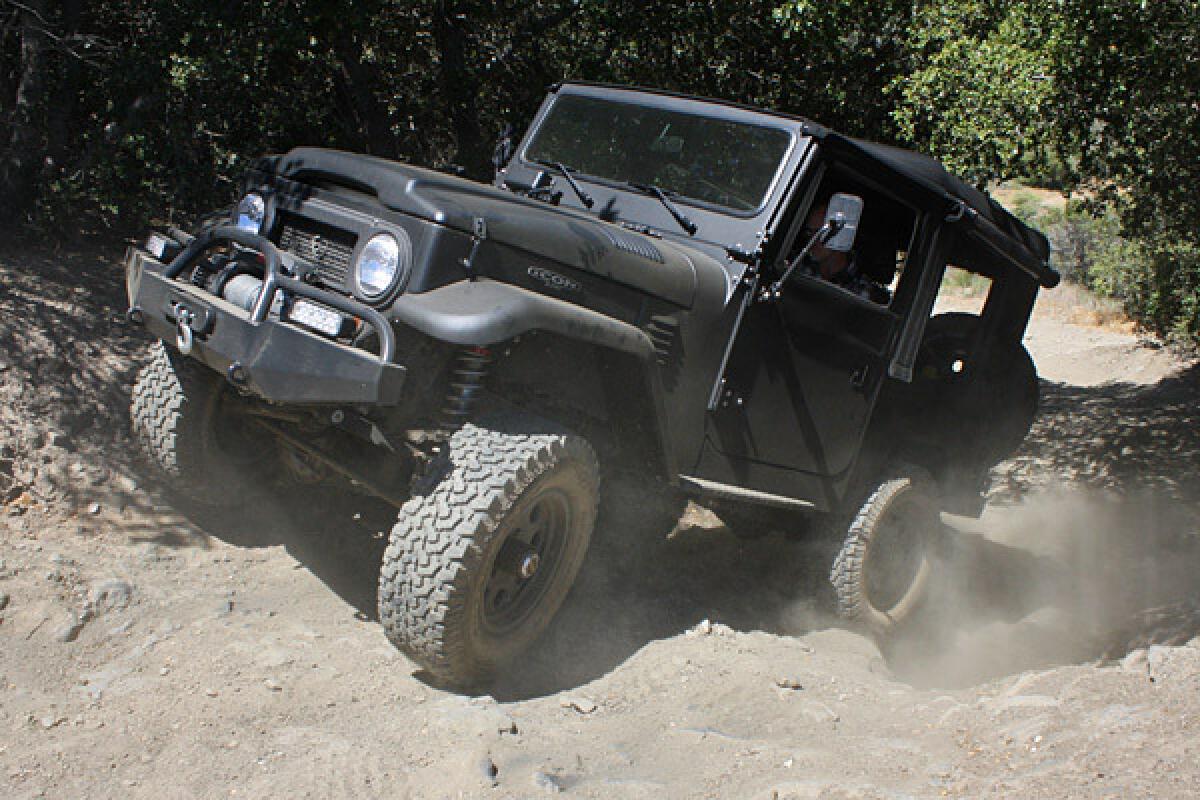Saturday Drive: Icon FJ40

- Share via
The car: 2012 Icon FJ40
The power: 420 horsepower and 458 pound-feet of torque from a custom-spec 5.7-liter V-8 engine; four-speed automatic transmission with overdrive; part-time, shift-on-the-fly, four-wheel-drive.
The bragging rights: One of the most expensive ways to climb walls in a hand-crafted vehicle.
The price: The FJ40 starts at around $127,000. The model we tested was closer to $148,000.
The details: Icon is a shop based in Chatsworth that builds three different custom vehicles by hand, to the tune of 18 to 20 sales a year, according to owner Jonathan Ward. The vehicles are based on classic versions of, yes, iconic 4x4s: the Ford Bronco, Jeep CJ and Toyota Land Cruiser FJ40. They’re aimed at wealthy buyers who appreciate the craftsmanship and modern interpretation of historic off-roaders.
We tested an FJ40, which is hand-built using all-aluminum body panels made in Canada and an updated Land Cruiser frame that’s reinforced with steel rails. A pair of engines is offered, both of which are crate motors from GM.
The base engine is a Vortec 5.3-liter V-8 good for 350 horsepower, but our tester had the optional LS6 engine (which you may remember playing a starring role in the Corvette C5 Z06 and the original Cadillac CTS-V). In order to better serve a 4x4 rather than a rear-wheel drive American-made hoon machine, this aluminum-blocked 5.7-liter V-8 was built to spec for Icon with a Vortec truck intake and injectors.
Thus, it makes 420 horsepower and 458 pound-feet of torque. It routes this power to the wheels via a standard five-speed manual transmission similar to one found on older Jeeps. The model we tested upgraded that unit to a heavy-duty four-speed automatic transmission (the Hydra-Matic 4L65, for those keeping score at home).
The Icon FJ40 also features part-time four-wheel drive. Drivers can shift on the fly, and the twin stick setup provides individual control of the front and rear axles for extra precision. Meanwhile, the transfer case is an Atlas II two-speed unit, the axles are Dynatrac Dana 60 and Dana 40 setups, and the vehicle has optional locking front and rear differentials.
Soaking up the bumps is 12 inches of front and rear wheel travel, courtesy of Fox Racing shocks and Eibach springs. Braking duty on our tester is handled by the optional Sport Brake package that uses six-piston front calipers and four-piston rear calipers.
Inside the FJ, Icon has gone to lengths to replicate the sparse simplicity of original Toyota FJ40s. Only a pair of gauges are visible, denoting speed and RPM on one and fuel level, oil temperature, water temperature and battery voltage on the other.
A custom audio system is hidden in the locking compartment below the center console and a mere six knobs on the dash, made from beautifully CNCed stainless steel, control the heating and air conditioning. The heated front seats on our model were covered in a material called Chilewich that sounds like it causes heartburn but really just gives users a super durable surface that’s also comfortable to sit on.
Icon sweats the details too. The body is powder coated with a Teflon-polyester mix for a scratch-proof finish. In the engine bay sits a tank of compressed carbon dioxide, the better to refill tires, inflate a sleeping pad or recharge the keg in the event you wander into a tailgating party. The softtop is removable (and, on our tester, insulated) and made from the same heavy-duty canvas that many mainstream manufacturers use as original equipment.
Because Icon builds these FJs by hand, buyers have a huge number of customizable build options. The rear seat can be eliminated altogether, and any number of storage configurations can be installed, depending on what you want to use the vehicle for. Longer wheelbase options allow for a truck bed or a four-door model with three rows of seats.
The drive: Ward says most owners will use the FJ40s on the street, so that’s where we start. With the windows unzipped and the tires fully inflated, the FJ is a capable highway cruiser and can handle the street ably. There is little of the wallowing and vagary that some purpose-built 4x4 vehicles exhibit on the road, and the FJ’s steering is nicely communicative. The engine is pass happy at nearly any speed, though the four-speed automatic means you’ll usually need to give the gas a solid shove to bring on a necessary downshift.
Street time in the Icon FJ40 shows it’s a vehicle you could leave on the road its entire life and happily use as a daily driver. But that would be like dating Adele and never asking her to sing for you. The real fun is when you let the FJ40 loose in some dirt. To do so, we took it to the Rowher Flat Off-Highway Vehicle area in Newhall.
Holy grappling gun, this thing can climb.
And we were driving with a slight handicap: Our tester was built for a customer in Chicago who needed less suspension travel than typically comes on the FJ40. Also making things interesting was the fact that this vehicle was rolling on BF Goodrich all-terrain tires, which are more like an aggressive shoe than an outright hiking boot. For true off-roading, more appropriate rubber is available.
But you wouldn’t know of these foibles to ascend in this FJ; a mountain goat with a jet pack couldn’t handle the inclines we mashed our way through. With gobs of torque and the ability to precisely control power to each axle, the Icon made quick work of Rowher Flat’s gnarled and daunting Lookout Trail. Rocks (loose and embedded), dirt and roots were powered through or over, regardless of how steep the trail was pitching or the speed (or lack thereof) necessary to keep moving. Descending was equally enlightening; I’d never been able to use the windshield as a footrest before.
To be sure, $150,000 is an immense pile of cash that’s steep enough to give even this Icon trouble. But neither Ward nor his customers seem to care. They see this as a hand-made custom vehicle built (mostly) in the U.S. with an obsessive eye for detail. Something with this level of craftsmanship, exclusivity and performance is exceptionally rare in the marketplace.
More to Read
Inside the business of entertainment
The Wide Shot brings you news, analysis and insights on everything from streaming wars to production — and what it all means for the future.
You may occasionally receive promotional content from the Los Angeles Times.









